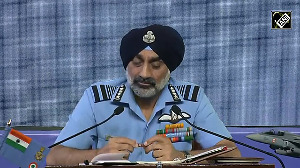The nonproliferation lobby in the United States, which is vehemently opposed to the India-US nuclear deal, has objected strongly to the new draft proposal submitted by the Bush administration to the Nuclear Suppliers Group in Vienna, before it convenes on August 21 to consider the India-specific exemption from NSG rules. The group has termed the proposal 'an abomination that should be flatly rejected by the NSG'.
Coverage: The Nuclear Deal
The Washington, DC-based Arms Control Association, which has coordinated the opposition to the deal among a coalition of nonproliferation groups and activists, said the new US proposal has problems that 'run deep', and reflects demands made by India that "are more than the requirements and policies of NSG member states or that of the US Congress."
It alleged, "The US State Department appears to be outsourcing its policymaking to the government of India and its high-priced lobbyists."
"In short, the proposal is an abomination that should be flatly rejected by the NSG," the ACA added.
'Clean waiver for nuclear deal is a fantasy'
It complained that the US proposal submitted to Germany, the current chair of the NSG, to be circulated among the 45-member group, "is the latest step in President George W Bush's effort to seek India-specific exemptions from US and NSG nuclear trade restrictions on states that do not allow full-scope safeguards."
According to the ACA, the new US proposal -- while based closely on a March 2006 pre-decisional draft -- "has been weakened further as a result of US acquiescence to Indian demands to delete or modify certain sections, particularly those that would link nuclear trade with India to its compliance with certain nonproliferation commitments."
Explained: The IAEA safeguards agreement
It said that "if, as India is demanding, supplier states agree to help India amass a strategic reserve of nuclear fuel or agree to provide lifetime reactor fuel supplies, the current NSG exemption," as contained in the new US proposal, "would allow India to resume nuclear testing without fear of losing access to nuclear fuel supplies."
"Contrary to the US Henry Hyde Act -- the 2006 US law regulating future US nuclear trade with India -- the current US proposal to the NSG fails to specify that if India resumes nuclear testing, nuclear trade with India would be terminated," the ACA contended.
Explained: The Nuclear Deal
Continuing to call it a "much weaker formulation that the already weak March 2006 US draft proposal," the nonproliferation lobby argued that "in essence, the Bush administration is proposing an NSG rule-change that would not only erode rules-based efforts to curb the spread of nuclear weapons, but it would also allow other states to interpret or ignore the India-specific NSG guideline as they see fit and undermine how US lawmakers would like to see such a rule applied."
"For instance," it argued, "Russia has already shown its blatant disregard for existing NSG guidelines by re-supplying India's two Tarapur light-water reactors in 2001 and 2006."
Let the nuclear deal go through: Brajesh Mishra
The ACA added, "the Bush administration's proposed India-specific exemption is a nonproliferation disaster that could effectively end the NSG as a meaningful entity."
It warned that "if NSG states agree under pressure from an outgoing US administration to blow a hole in NSG guidelines in order to allow a few states to profit from reactor and nuclear fuel and technology sales to India, they should at a minimum, support common sense restrictions and conditions on such trade."
Full text of India-IAEA agreement
Among the remedies it recommended:
· NSG states should establish a policy that if India resumes nuclear testing, or violates its safeguards agreements, trade involving nuclear items with India should be terminated and unused fuel supplies should be returned.
· NSG states should expressly prohibit any transfer of sensitive reprocessing, enrichment, or heavy water production items or technology.
· NSG states should actively oppose any arrangement that would give India any special safeguards exemptions that would in any way be inconsistent with the principle of permanent safeguards over all nuclear materials and facilities. NSG states should not take any decision unless India and the IAEA conclude a meaningful Additional Protocol to supplement its new facility specific safeguards.
· Before India is granted a waiver from the NSG's full-scope safeguards standards, NSG states should call upon it to join with four of the five original nuclear weapon states in declaring that it has stopped fissile material production and call upon India to transform its nuclear test moratorium pledge into a legally binding pledge, perhaps by signing the Comprehensive Test Ban Treaty.
Non-proliferation lobby flays safeguard agreement
Earlier, the ACA took a hefty swipe at International Atomic Energy Agency director-general Mohamed El-Baradei for failing "in his basic responsibility to ensure there is a clear understanding between the Indians and the IAEA that the agreement (which was approved unanimously by the board of governors last month) is consistent with IAEA standards and practices for terminating safeguards."





